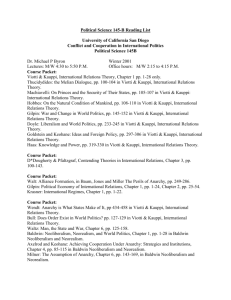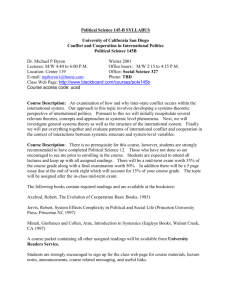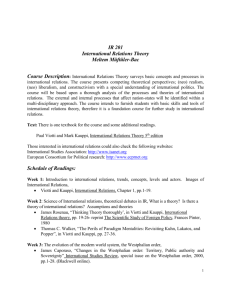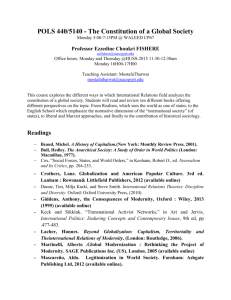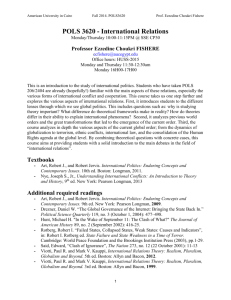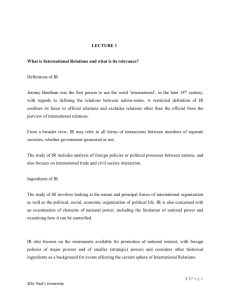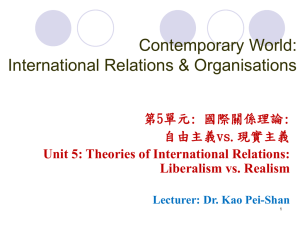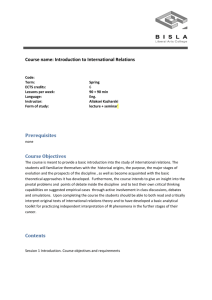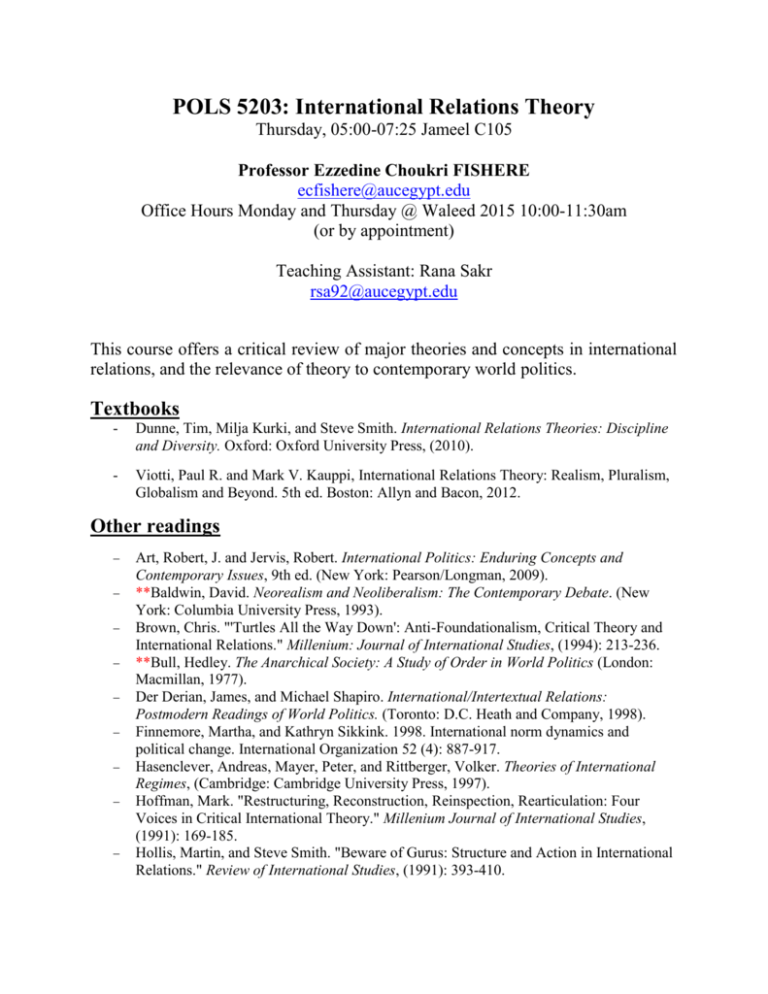
POLS 5203: International Relations Theory
Thursday, 05:00-07:25 Jameel C105
Professor Ezzedine Choukri FISHERE
ecfishere@aucegypt.edu
Office Hours Monday and Thursday @ Waleed 2015 10:00-11:30am
(or by appointment)
Teaching Assistant: Rana Sakr
rsa92@aucegypt.edu
This course offers a critical review of major theories and concepts in international
relations, and the relevance of theory to contemporary world politics.
Textbooks
-
Dunne, Tim, Milja Kurki, and Steve Smith. International Relations Theories: Discipline
and Diversity. Oxford: Oxford University Press, (2010).
-
Viotti, Paul R. and Mark V. Kauppi, International Relations Theory: Realism, Pluralism,
Globalism and Beyond. 5th ed. Boston: Allyn and Bacon, 2012.
Other readings
Art, Robert, J. and Jervis, Robert. International Politics: Enduring Concepts and
Contemporary Issues, 9th ed. (New York: Pearson/Longman, 2009).
**Baldwin, David. Neorealism and Neoliberalism: The Contemporary Debate. (New
York: Columbia University Press, 1993).
Brown, Chris. "'Turtles All the Way Down': Anti-Foundationalism, Critical Theory and
International Relations." Millenium: Journal of International Studies, (1994): 213-236.
**Bull, Hedley. The Anarchical Society: A Study of Order in World Politics (London:
Macmillan, 1977).
Der Derian, James, and Michael Shapiro. International/Intertextual Relations:
Postmodern Readings of World Politics. (Toronto: D.C. Heath and Company, 1998).
Finnemore, Martha, and Kathryn Sikkink. 1998. International norm dynamics and
political change. International Organization 52 (4): 887-917.
Hasenclever, Andreas, Mayer, Peter, and Rittberger, Volker. Theories of International
Regimes, (Cambridge: Cambridge University Press, 1997).
Hoffman, Mark. "Restructuring, Reconstruction, Reinspection, Rearticulation: Four
Voices in Critical International Theory." Millenium Journal of International Studies,
(1991): 169-185.
Hollis, Martin, and Steve Smith. "Beware of Gurus: Structure and Action in International
Relations." Review of International Studies, (1991): 393-410.
Holsti, K.J. "Mirror, Mirror on the Wall, Which are the Fairest Theories of All?"
International Studies Quarterly, (189): 255-261.
Holsti, K.J. The Dividing Discipline: Hegemony and Diversity in International Theory.
(Boston: Allen & Unwin, 1983).
Keohane, Robert O. “Beyond Dichotomy: Conversations Between International Relations
and Feminist Theory,” International Studies Quarterly 42, no. 1 (March 1, 1998): 193197.
Keohane, Robert O., ed. Neorealism and Its Critics. (New York, New York: Columbia
University Press, 1986).
Lacher, Hannes. Beyond Globalization: Capitalism, Territoriality and Theinternational
Relations of Modernity, (London: Routledge, 2006).
**Lenin, Vladimir Ilʹich. Imperialism, the Highest Stage of Capitalism: A Popular
Outline. (New York: International Publishers, 1984).
Mills, Albert J. and Long, Brad S. “Globalization, Postcolonial Theory, and
Organizational Analysis,” Critical Perspectives on International Business 4, no. 4
(October 1, 2008): 389-409.
Mingst, Karen A., and Snyder, Jack. Essential Readings in World Politics. (New York:
W. W. Norton & Company, 2001).
**Morgenthau, Hans. Politics Among Nations: The Struggle for Power and Peace. (New
York: Knopf, 1954, 1960, 1967)
Porter, Tony. "Postmodern Political Realism and International Relations Theory's Third
Debate." In Positivism: Critical Reflections on International Relations, 105-127.
(Boulder, Colorado: Lynne Reinner Publishers Inc., 1994).
Siddharth, M. “Postcolonialism, International Law and the Nuclear Question,”
International Studies 37, no. 2 (April 1, 2000): 129-142.
Skopol, Theda. “Wallerstein's World Capitalist System: A Theoretical and Historical
Critique ("The Modern World-System: Capitalist Agriculture and the Origins of the
European World-Economy in the Sixteenth Century" by Immanuel Wallerstein),”
American Journal of Sociology 82, no. 1 (January 1, 1976): 1075-1091.
Smith, Steve, Ken Booth, and Marysia Zalewski. 1996.International theory: Positivism
and beyond. Cambridge: Cambridge University Press.
Strange, Susan. "Cave! hic dragones: a critique of regime analysis." International
Organization, (1982): 479-496.
Viotti, Paul R. and Mark V. Kauppi, International Relations Theory: Realism, Pluralism,
Globalism and Beyond. 3rd ed. Boston: Allyn and Bacon, 1999.
Waller, Nicole. “Not for the Overthrow of Government”? Postcolonialism and
Nationhood in an American Studies Perspective,” Neohelicon 35, no. 2 (December 1,
2008): 147-160.
**Wallerstein, Immanuel, Maurice. World-Systems Analysis: An Introduction (Durham
NC: Duke University Press, 2004).
**Waltz, Kenneth. Man, the State, and War: A Theoretical Analysis. (New York:
Columbia UP, 1959).
**Waltz, Kenneth. Theory of International Politics. (New York: McGraw Hill, 1979).
Wendt, Alexander “Anarchy is What States Make of It - The Social Construction of
Power-Politics,” International Organization 46, no. 2 (March 1, 1992): 391-425.
Evaluation
1.
2.
Attendance
13%
Each session of full attendance accounts for 1%. Partial attendance (late arrival or early
departure) accounts for 0.5%.
If a student misses three sessions, an F grade will automatically apply to his/her overall
class grade.
There is no system of permitted (excused) absences.
No make-up assignments are accepted.
Participation
10%
Participation is measured every single class. Each session, students submit a one-pager
summary of the readings marked with an asterisk. The summary should identify the
author’s argument, the theoretical underpinnings of this argument, and the contribution
this argument makes to our understanding of international relations.
Each Commentary accounts for 1% of the final grade.
3.
Book review
7%
Students will review a book in one of the classic three traditions in IR theory (Realism,
Pluralism and Marxism—books are marked with a double asterisk).
Book Reviews are due the day when we discuss the tradition in which the book is
inscribed.
4.
Review sheets
10% each (total 40%)
Each student will submit a review sheet at the end of every major school of thought in
IRT (Realism, Pluralism, Marxism, and Critical Theories). The Sheet, around 1250
words, should sum up the basic argument of this school of thought, its theoretical and
epistemological underpinning, as well as assessing its contribution to IRT.
Each sheet counts for 8% of the final grade.
5.
Final paper
30%
The paper will compare two schools of thought in IRT through the analysis of two major
works representing these two theories. The paper should also assess the relevance of
these two schools of thought and their usefulness in analyzing world politics.
The paper should be around 5000 words.
The following is the grading scheme in this class
A
starting 90%
Astarting 88%
B+
starting 85%
B
starting 80%
Bstarting 78%
Submission of work
All submissions should be typed, in Times New Roman font, size 12, spaced in 1.5, 1inch margin each side, on regular A4 sheets. Students should write their name as it
appears in the Registrar, the name of the course and instructor and the date on a cover
page.
Late submissions are not accepted at all. Late submission of the final paper, though, is
accepted, at a cost: each day will reduce the grade by one level (for example: a B+ paper
becomes B). Any paper submitted after three days will receive an F. Submission is the
student’s responsibility:
No make-up assignments are possible.
Expectations
The AUC
has adopted a zero-tolerance policy regarding academic integrity. Students
should expect these rules to apply.
Students are expected to observe general rules of civility (turn off your mobile phone
before you come, listen to your colleagues and avoid interrupting them, don’t monopolize
the discussion, be considerate of others, etc.).
Negotiation is a skill that students do not need in this course in any shape or form.
Communication
The instructor is available to answer the students’ questions about the academic content
of this course. This could happen during the class time and office hours (see above).
Students who have difficulties meeting the instructor during these times should make
arrangements so that they can. Emails to the instructor should not be perceived as a
notification (of absence, delays, or any other change in schedule or course requirements).
In this course, emails do not substitute direct communication.
All questions regarding course readings should be directed to the teaching assistant.
Schedule
Week 1 (6 February)
Introduction
Kurki and Wight. “International Relations and Social Sciences,” in Dunne, pp. 1-34.
Week 2 (13 February)
The State of IR Theory
Smith. “Introduction: Diversity and Disciplinarity in International Relations Theory,” in
Dunne, pp. 1-13.
Holsti, K.J. (1983) “The Dividing Discipline: Hegemony and Diversity in International
Theory” Chapter 1, pp. 1-13.
Viotti and Kauppi. “Thinking about IR Theory,” in Viotti and Kauppi, pp. 1-18.
Rosenau. “Thinking Theory Thoroughly,” in Viotti and Kauppi, pp. 19-26.
* Smith, Steve. “Positivism and Beyond,” in Smith, Booth, and Zalewski, International
Theory: Positivism and Beyond, pp. 11-46.
Week 3 (20 February)
Classic Realism
Lebow. “Classical Realism,” in Dunne pp. 58-76
Thucydides. “The Melian Dialogue,” in Viotti and Kauppi, pp. 83-87.
Machiavelli. “On Princes and the Security of Their State,” in Viotti and Kauppi, pp. 8890.
Hobbes. “Of the Natural Condition of Mankind,” in Viotti and Kauppi, pp. 90-93.
Clausewitz. “War as an Instrument of Policy,” in Mingst and Snyder, pp. 236-240.
* Morgenthau, Hans J. Politics Among Nations: The Struggle for Power and Peace. (New
York: Alfred A. Knopf, 1948), Chapters 1 and 3, 8, 10 and 11 (on reserve).
* Waltz. “Explaining War,” in Viotti and Kauppi pp. 96-109.
Week 4 (27 February)
Structural Realism
Mearsheimer. “Structural Realism,” in Dunne pp. 75-92.
Keohane. “Theory of World Politics: Structural Realism and Beyond,” in Viotti and
Kauppi (1999) pp. 153-183.
* Ashley. “The Poverty of Neorealism,” in Keohane. Neorealism and Its Critics, pp. 253300.
Week 5 (6 March)
Pluralism I: Liberalism
Reminder: Submit the ‘Realisms’ review sheet today
Viotti and Kauppi. “Normative Considerations in International Relations Theory,” in
Viotti and Kauppi pp. 391-414.
Grotius. “War, Peace, and the Law of Nations,” in Viotti and Kauppi (1999), pp. 410414.
Kant. “Morality, Politics, and Perpetual Peace”, in Viotti and Kauppi, pp. 415-420.
Carr. “The Nature of Politics,” in Viotti and Kauppi, pp. 421-424.
* Doyle. “Liberalism and World Politics,” in Viotti and Kauppi (1999), pp. 233-245.
* Moravcsik. “Taking Preferences Seriously: A Liberal Theory of International Politics,”
in Viotti and Kauppi (1999), pp. 246-256.
Dunne. “The English School,” in Dunne pp. 136-156.
* Bull, Hedley. The Anarchical Society: A Study of Order in World Politics (London:
Macmillan, 1977), pp. 3-52.
Week 6 (13 March)
Pluralism II: Foreign Policy Making and Interdependence
Viotti and Kauppi. “Liberalism: Interdependence and Global Governance,” in Viotti and
Kauppi pp. 129-166.
Jervis. “Perception and Misperception in International Politics,” in Viotti and Kauppi
(1999) pp. 257-268.
* Holsti. “Crisis Decision-Making,” in Viotti and Kauppi (1999), pp. 269-279.
Allison. “Conceptual Models and the Cuban Missile Crisis,” in Viotti and Kauppi (1999),
pp. 280-297.
* Keohane and Nye. “Realism and Complex Interdependence,” in Viotti and Kauppi
(1999), 307-319.
Keck and Sikkink. “Transnational Activist Networks,” in Art and Jervis, International
Politics: Enduring Concepts and Contemporary Issues, 9th ed, pp .477-483.
Week 7 (20 March)
Pluralism III: International Regimes
Hasenclever, Andreas, Mayer, Peter, and Rittberger, Volker. Theories of International
Regimes, (Cambridge: Cambridge University Press, 1997), pp. 1-8.
Haas. “Multilateralism, Knowledge, and Power,” in Viotti and Kauppi (1999), pp. 319329.
Ruggie. “Multilateralism: The Anatomy of an Institution,” in Viotti and Kauppi (1999),
pp. 331-339.
* Keohane. “Institutional Theory and the Realist Challenge After the Cold War,” in
Baldwin, David. Neorealism and Neoliberalism: The Contemporary Debate. (New York:
Columbia University Press, 1993) pp. 269-300.
* Grieco. “Understanding the Problem of International Cooperation: The Limits of
Neoliberal Institutionalism and the Future of Realist Theory,” in Baldwin, David.
Neorealism and Neoliberalism: The Contemporary Debate. (New York: Columbia
University Press, 1993), pp. 301-338.
Strange, “Cave! Hic dragones: a critique of regime analysis,” International
Organizations. 36, 2, Spring 1982, pp. 479-498.
Week 8 (27 March)
Marxism, Imperialism and Dependency
Reminder: Submit the ‘Pluralism’ review sheet today
Rupert. “Marxism and Critical Theory,” in Dunne pp 157-176.
Viotti and Kauppi. “Economic Structuralism: Global Capitalism and Postcolonialsim,” in
Viotti and Kauppi , pp. 189-218.
* Lenin, Vladimir Ilʹich. Imperialism, the Highest Stage of Capitalism: A Popular
Outline. (New York: International Publishers, 1984), pp. 15-87. (On Reserve).
Hobson. “The Economic Taproot of Imperialism,” in Viotti and Kauppi, pp. 219-222.
* Frank. “The Development of Underdevelopment,” in Mingst and Snyder, pp. 52-60.
* Wallerstein, Immanuel Maurice. World-Systems Analysis: An Introduction (Durham
NC: Duke University Press, 2004).
Skopol, Theda. “Wallerstein's World Capitalist System: A Theoretical and Historical
Critique,” American Journal of Sociology 82, no. 1 (January 1, 1976), pp. 1075-1091.
Week 9 (3 April)
Critical Political Economists
* Cox, “Social Forces, States, and World Orders,” in Keohane, Robert O., ed. Neorealism
and Its Critics, pp. 204-253.
Murphy. “International Organization and Industrial Change,” in Viotti and Kauppi
(1999), pp. 383-395.
* Gills and Palan, “The Neostructuralist Agenda in International Relations,” in Viotti and
Kauppi (1999), pp. 377-382.
* Lacher, Hannes. Beyond Globalization: Capitalism, Territoriality and Theinternational
Relations of Modernity, (London: Routledge, 2006), Chapter 3 (pp. 45-60) and Chapter 8
(pp. 147-167).
Week 10 (10 April)
Feminism
Reminder: Submit the ‘Marxisms’ review sheet today
Tickner and Sjoberg. “Feminism,” in Dunne, pp. 195-211.
* Tickner. “Man, the State, and War: Gendered Perspectives on National Security” and
“You Just Don’t Understand: Troubled Engagements between Feminists and IR
Theorists” in Mingst and Snyder, pp. 60-67 and 120-137.
* Jaquette. “Women in Power: From Tokenism to Critical Mass,” in Mingst and Snyder,
pp. 217-223.
Keohane, Robert O. “Beyond Dichotomy: Conversations Between International Relations
and Feminist Theory,” International Studies Quarterly 42, no. 1 (March 1, 1998), pp.
193-197. (available online)
Week 11 (24 April)
Post-colonialism
Grovogui, “Postcolonialism,” in Dunne, pp. 238-256.
* Siddharth, M. “Postcolonialism, International Law and the Nuclear Question,”
International Studies 37, no. 2 (April 1, 2000), pp. 129-142. (available online)
Mills, Albert J. and Long, Brad S. “Globalization, Postcolonial Theory, and
Organizational Analysis,” Critical Perspectives on International Business 4, no. 4
(October 1, 2008), pp. 389-409. (available online)
Waller, Nicole. “Not for the Overthrow of Government”? Postcolonialism and
Nationhood in an American Studies Perspective,” Neohelicon 35, no. 2 (December 1,
2008), pp. 147-160. (available online)
Week 12 (8 May)
Constructivism
Fierke, “Constructivism,” in Dunne, pp. 177-194.
* Wendt, Alexander “Anarchy is What States Make of It - The Social Construction of
Power-Politics,” International Organization 46, no. 2 (March 1, 1992), pp. 391-425.
(available online)
* Finnemore, Martha and Kathryn Sikkink (1998) “International Norm Dynamics and
Political Change,” International Organization 52 (4): 887-917. (available online)
Hollis, Martin, and Steve Smith. "Beware of Gurus: Structure and Action in International
Relations." Review of International Studies, (1991), pp. 393-410.
Week 13 (15 May)
Post-Structuralism
Reminder:Submit the ‘Critical theories’ review sheet today
Campbell. “Poststructuralism,” in Dunne, pp. 213-237.
Brown, Chris. "'Turtles All the Way Down': Anti-Foundationalism, Critical Theory and
International Relations." Millenium: Journal of International Studies, (1994): 213-236.
Porter, Tony. "Postmodern Political Realism and International Relations Theory's Third
Debate." In Positivism: Critical Reflections on International Relations, pp. 105-127.
* Der Derian. “The Boundaries of Knowledge and Power in International Relations” in
Der Derian, James, and Michael Shapiro. International/Intertextual Relations:
Postmodern Readings of World Politics, pp. 3-10.

